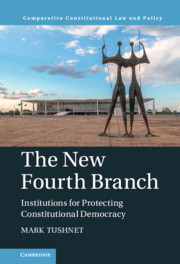
-
Select format
-
- Publisher:
- Cambridge University Press
- Publication date:
- 20 August 2021
- 02 September 2021
- ISBN:
- 9781009047609
- 9781316517833
- 9781009048491
- Dimensions:
- (229 x 152 mm)
- Weight & Pages:
- 0.44kg, 198 Pages
- Dimensions:
- (229 x 152 mm)
- Weight & Pages:
- 0.3kg, 198 Pages
You may already have access via personal or institutional login
Book description
Twenty-first-century constitutions now typically include a new 'fourth branch' of government, a group of institutions charged with protecting constitutional democracy, including electoral management bodies, anticorruption agencies, and ombuds offices. This book offers the first general theory of the fourth branch; in a world where governance is exercised through political parties, we cannot be confident that the traditional three branches are enough to preserve constitutional democracy. The fourth branch institutions can, by concentrating within themselves distinctive forms of expertise, deploy that expertise more effectively than the traditional branches are capable of doing. However, several case studies of anticorruption efforts, electoral management bodies, and audit bureaus show that the fourth branch institutions do not always succeed in protecting constitutional democracy, and indeed sometimes undermine it. The book concludes with some cautionary notes about placing too much hope in these – or, indeed, in any – institutions as the guarantors of constitutional democracy.
Reviews
‘In an age when integrity and democracy are under unprecedented pressure, Mark Tushnet's description of emerging constitutional ‘best practice' worldwide – systematic, realistic, and unemotional – helps to launch a new debate on whether, and how, the civic virtues that underpin good governance might be better institutionalized for all.'
A. J. Brown - Professor of Public Policy & Law, Griffith University; Board Member, Transparency International
‘For a discipline that has inexplicably remained focused on the role of apex courts for much of its existence, comparative constitutional studies should welcome Mark Tushnet's new book on the fourth branch as a sorely necessary intervention in the field. Mark captures the intuition that there is something distinctive about this new category of constitutional actors, increasingly popular with constitution makers, with characteristic insight and scholarly rigour. His characterization of the fourth branch as comprising ‘institutions to protect constitutional democracy' will no doubt encourage other theoretical attempts to find an appropriate conceptual substitute for the numerical placeholder for this branch. This book is an essential read for anyone interested in understanding constitutions, their functions, and their limits.'
Tarunabh Khaitan - Professor of Public Law and Legal Theory & Hackney Fellow in Law, Wadham College, University of Oxford
‘In this already indispensable work on the theory and practice of designing innovative government structures to protect constitutional democracy, Tushnet brilliantly and carefully appraises existing ‘fourth branch' institutions. A scholarly provocation favoring decentralized structures and remedies with more face-to-face interactions, the book demands reading by all serious scholars of constitutional government.'
Vicki C. Jackson - Laurence H. Tribe Professor of Constitutional Law, Harvard Law School
Contents
Metrics
Altmetric attention score
Full text views
Full text views help Loading metrics...
Loading metrics...
* Views captured on Cambridge Core between #date#. This data will be updated every 24 hours.
Usage data cannot currently be displayed.
Accessibility standard: Unknown
Why this information is here
This section outlines the accessibility features of this content - including support for screen readers, full keyboard navigation and high-contrast display options. This may not be relevant for you.
Accessibility Information
Accessibility compliance for the PDF of this book is currently unknown and may be updated in the future.


